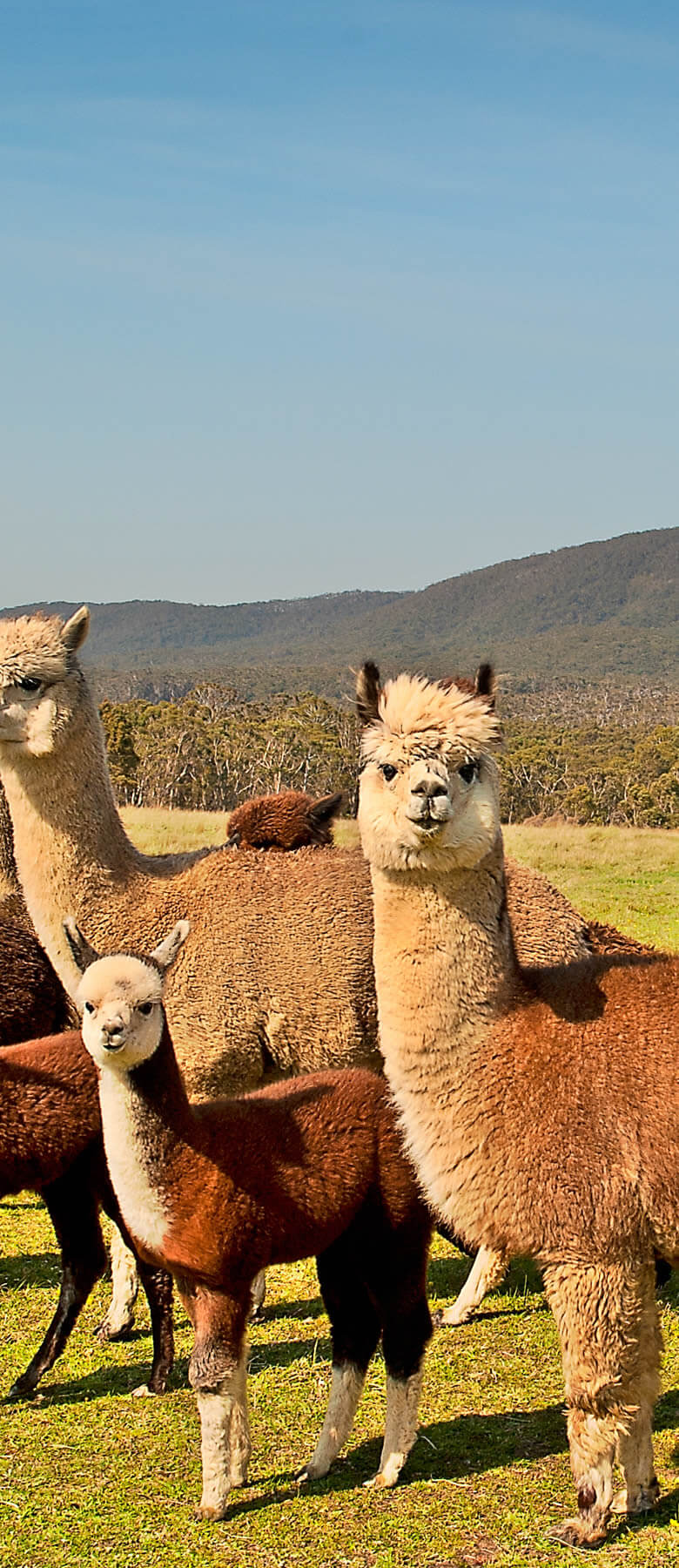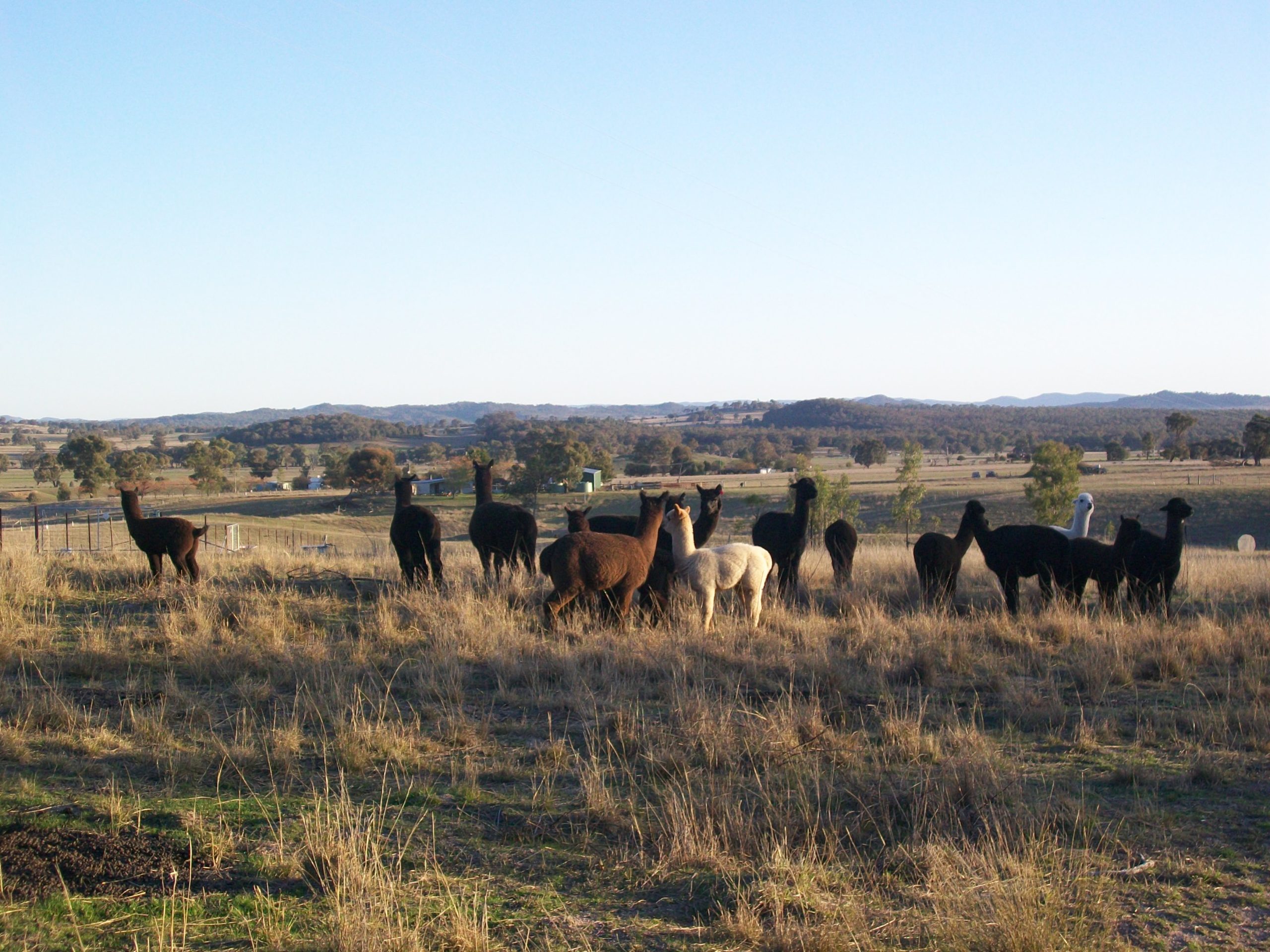Alpacas are now an established and beloved part of the Australian natural fibres, breeding and farming industries. As the second largest alpaca industry in the world, following the Peruvian alpaca industry, Australia is at the forefront of breeding, fibre quality and development. We have reached record prices and quality, and are moving from strength to strength, focused on increasing production volumes and improving consistency. The Australian Alpaca Association plays a vital role in the current strength and continued development of the industry by providing education, communication, resources and marketing for the industry as a whole.
The international export demand for Australian quality alpaca fleece far outstrips demand, so the industry has great potential for further growth. In support, the AAA encourages sustainable husbandry focusing on animal health, breeding programs and herd development.
Building on the strength of the Australian wool industry, the AAA has teamed up with the AWEX (Australian Wool Exchange) to establish quality assurance guidelines for alpaca fleece that are equivalent to the standards of the wool industry. This means consistent classing, packaging and branding of Australian alpaca fleece. This move will enhance the commercial image and guarantee a consistently high-level product through an organised collection system for fleece production.
The Alpaca Lifestyle
Those interested in commercial breeding and farming of alpacas are entering a strong industry that provides support, guidelines, and a great reputation. You may choose to focus on alpacas or diversify your current livestock herds by introducing alpacas. These animals mix well with other ruminants and function well as herd guards for smaller livestock. They are sustainable and environmentally friendly, with soft footpads that create minimal soil damage, and their natural fibre further supports the green natural fibre industry. Alpacas are a great green fit for Australia’s farming climate, as they perform far better in dry conditions than most livestock. As ruminants, they require only small amounts of supplementary feeding.
The alpaca lifestyle extends in many directions, as alpacas are also ideal for small-scale and home production, where owners of small herds value-add to their fleece by producing fibre products themselves, such as felts and yarns. There are a variety of ways that farmers sell their animals, for example via individual private sales, advertising on eAlpaca or other applications, a herd reduction sale, or if there is an intention to leave the industry, a dispersal sale.
The alpaca meat industry is another pathway to commercial alpaca farming, and is growing in popularity as alpaca meat is extremely lean, highly nutritious, and flavoursome. It is an excellent source of protein with little saturated fat or cholesterol, and is environmentally sustainable to produce. Alpacas also offer a high yield with very little wastage.
Overview of the Australian Alpaca Industry
Alpaca care
Information on how to look after your alpacas
Buying your first alpacas?
Are you just getting into the alpaca industry and not sure where to start? – check out our guide on buying your first alpacas
Alpaca biosecurity
All alpaca growers, from commercial operators, to showing enthusiasts, to people starting with their first few alpacas, or other species producers with alpacas as herd guardians form part of the alpaca industry. Each and every grower has a role to play in protecting alpacas from established and exotic pests.
Animal welfare
Animal welfare is a key priority for the Australian Alpaca Association (AAA), and as the peak national body for the alpaca industry in Australia, we believe that the industry will benefit from a united approach to animal welfare. Individuals involved in the alpaca industry and its supply chains must take a proactive approach to ensure that a positive welfare state is achieved for each animal in their care.
The IAR Database
The Australian Alpaca Association runs an alpaca pedigree register – the International Alpaca Register (IAR). The IAR is recorded on eAlpaca – a bespoke online system designed and built specifically for the AAA.
Alpaca FAQ
Have a question about alpacas you need answered? Head on over to our handy FAQ guide and find the answers you need.
Vets with alpaca experience
We have a directory of veterinarians with experience treating a variety of alpaca related health issues around Australia.
Alpaca meat
Alpaca meat is highly nutritious, lean and flavoursome. It is an excellent source of protein with little saturated fat or cholesterol and is environmentally sustainable to produce. As most parts of the alpaca can be used for meat, alpacas offer a high yield with little wastage.
Herd guards
Alpacas are rapidly becoming accepted as essential complements to all sheep and goat breeding enterprises where predators cause lambing and kidding losses.
Alpaca Exports
Australian alpacas are highly valued in international markets
Alpacas and the Australian environment
Alpacas are undoubtedly the most environmentally friendly of all domesticated animals in Australia. Like all camelids, they do not have hooves but soft-padded feet, each with two fairly soft toenails. Their ground foot pressure of 39kPA is much less than sheep (82kPA), cattle (185kPA) and humans (95kPA). Even the kangaroo at 46kPA exerts more pressure on our thin top soils than the alpaca.
Alpacas differ slightly from true ruminants such as cattle and sheep because of the structure of their three-compartment stomachs. The alpaca’s digestion is adapted to high fibre diets and their dietary efficiency is superior to goats and sheep on a similar high fibre diet. Although their adult weight of 60-90 kg is greater than sheep, their DSE is between parity and 10% above the merino.
Alpacas place their dung and urine in specific spots and do not graze close to these, thus avoiding ingesting internal parasites to which they also have high resistance.
Alpacas grow fibre that is valued for its luxurious handle and lustre, and in a wide range of natural colours that is unique among commercial fibre producing animals. However, unlike many other animals, alpacas do not shed their fibre. Also, even when ‘bonded’ with an accompanying sheep flock and sleeping close by, alpacas will not come into physical contact with them unless forced to do so during yarding. Even then, the risk of fibre cross-contamination is much less likely than from sheep dogs during yard work.
The alpaca does not grow fibre underneath its short tail or in the breech area and avoids any contact with its urine or dung pellets due to the crouching nature of the alpaca during urination and defecation. Together with almost no grease in its fibre, this means that no mulesing or crutching is required, and fly strike does not occur.
Sustainability Framework
Agriculture is at the centre of many of the sustainability challenges facing the world today, with issues such as animal welfare, land degradation, biodiversity loss, climate change, population growth, water scarcity, and human rights challenging the way food and fibre are produced.
Customers and consumers want to feel confident that the food and fibre they purchase has been responsibly produced.
The alpaca industry in Australia is still in its infancy compared to other farming enterprises and does not share the same level of resources. However, we must still show that we are aware of our impact and are committed to addressing these issues. This will align us with other livestock industries throughout Australia and the world. It will allow us to maintain the trust and support of our customers and the community.
The Australian Alpaca Association is developing an Alpaca Sustainability Framework to document how we intend to meet our responsibilities and ensure a sustainable future for our industry.
The Sustainability Framework demonstrates to global consumers and manufacturers that members of the Australian Alpaca Association farm their alpacas in a way that is good for people, animals, and the environment.


